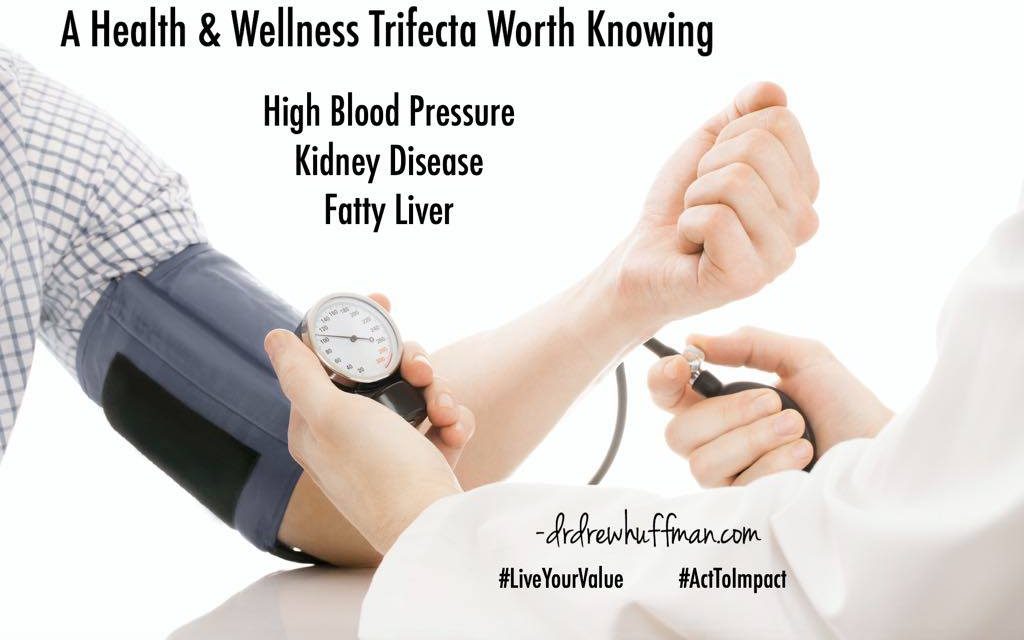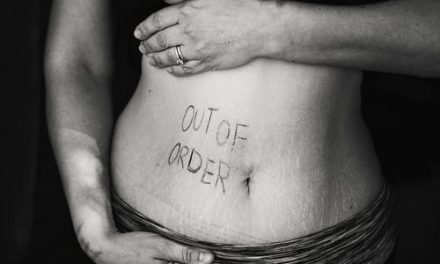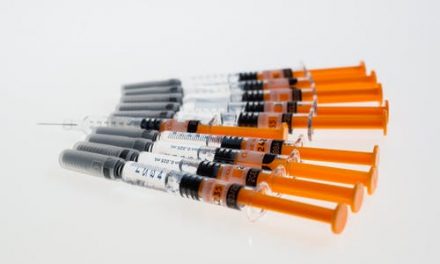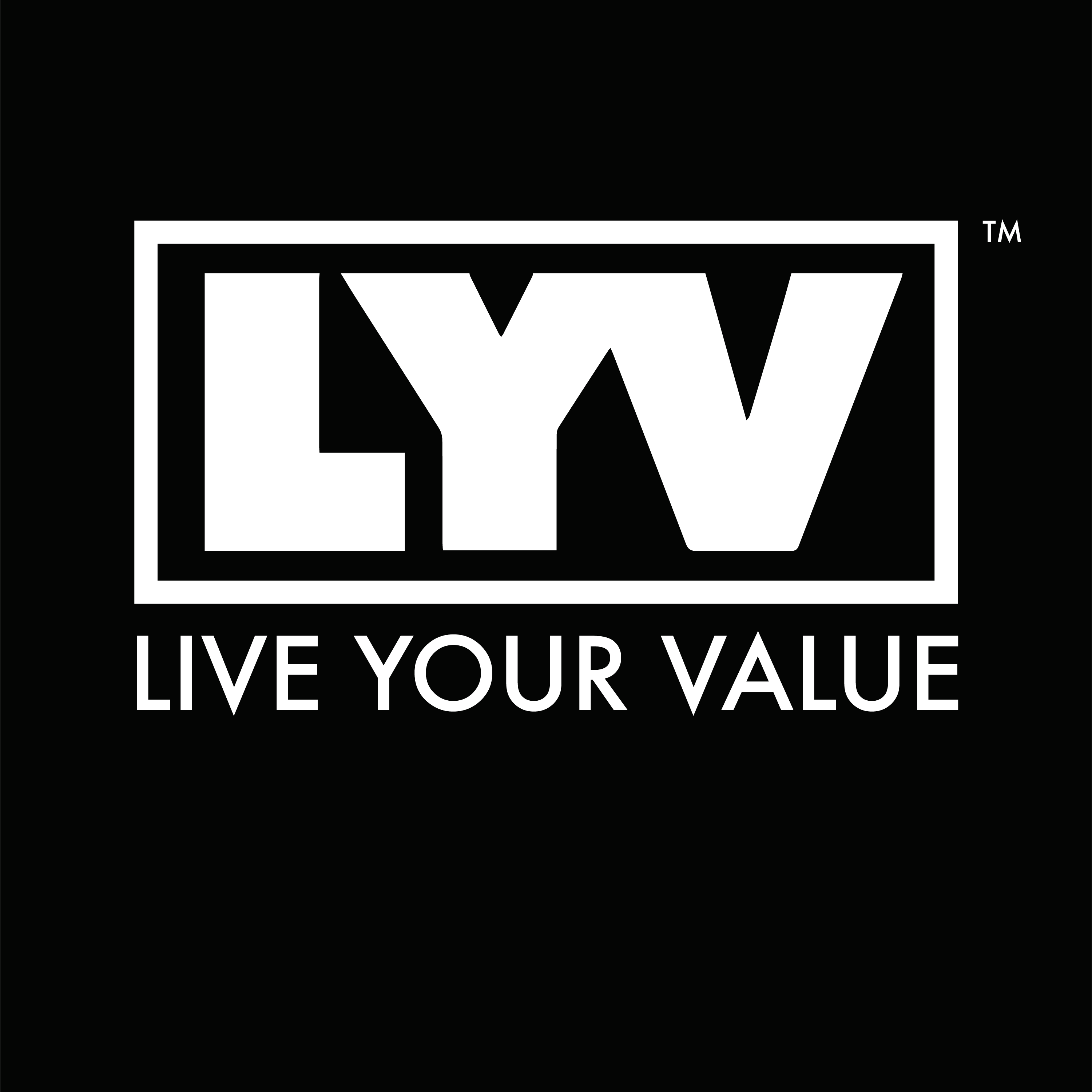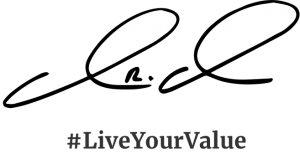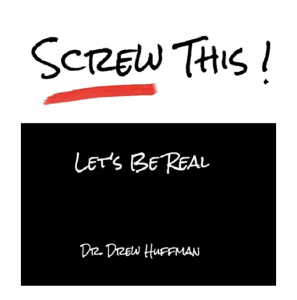High Blood Pressure, Kidney Disease, and Fatty Liver. If you have one: be on guard for the other two. Unlike most health issues, the trio of Hypertension, Kidney Disease, and Abnormal Liver are even more dangerous because we rarely feel the effects of them until it’s too late. I don’t know about you, but personally, if I don’t see it, feel it, or have it impact my physical reality on a relatively consistent basis, it doesn’t necessarily grab my attention.
Be warned: this is a massive topic so I can just cover the key points. First, let’s start with High Blood Pressure.
HIGH BLOOD PRESSURE DEFINED:
High Blood Pressure is also known as Hypertension (HTN). The first number represents your “systolic” (sis – tall – ic) pressure. Systolic BP measures the pressure of your blood pressure when your heart muscle beats (or contracts in order to push the blood through your body). The second number represents your “diastolic” (die – a – stahl – ic) pressure. Diastolic BP measures the pressure of your blood vessels when your heart muscle is not contracting (when it is at ‘rest’).
Current Classifications
Normal BP: less than 120/80
Elevated BP: 120-129/less than 80
Stage 1 HTN: 130-139/80-89
Stage 2 HTN: greater or equal to 140/greater or equal to 190
Hypertensive Crisis: greater than 180/greater than 120
Current recommendations for taking medication: Stage 1: if a person has already had a heart attack, stroke, has diabetes or chronic kidney disease and sometimes high cholesterol.
Current recommendations for the “Normal” or “Elevated BP” are lifestyle changes. That means live your value and make different, healthier choices.
WHY CARE ABOUT HTN?
If I honestly look back at my life, it’s pretty clear that up until my enlightenment a few years ago, I was always kind of a “here and now” guy. I never really focused on how my choices today could affect my tomorrow, my next year, or my next ten years. I have to say, it’s nice actually thinking about the future now and blood pressure is certainly something that we should focus on today in order to ensure a more content and healthier tomorrow.
After all, having Hypertension can lead to:
- Loss or decreased vision
- Sexual dysfunction
- Peripheral Artery Disease
- Heart attack
- Heart Failure
- Stroke
And if we get any of these, they can lead to other things like depression, lack of intimacy and difficulty with our relationships, pain, heart surgery, more medications, fatigue and inability to participate in activities that we want to participate in, and even an inability to speak, eat, or use our arms and legs. Not good.
SO, WHAT CAN WE DO?
The first step is the hardest . . . we have to actually care. We have to find, see, and believe the value we have in ourselves and our tomorrow just enough to become an active participant in our own health, regardless of who or what is around us. I know how challenging it can be—I’ve been there. Once we care, then it’s time to start living that value through the choices we make day in and day out.
HOW DO I #LiveYourValue AND DECREASE MY BLOOD PRESSURE?
Here are seven recommendations to help you decrease your blood pressure:
- Lose weight: This is the most effective treatment. Losing even 10 pounds can reduce blood pressure.
- Improve Nutrition: Eat more fruits and vegatables to crowd out the fried and processed foods.
- Reduce Sodium to 1500mg daily: Most Americans consume three times that amount. It’s not always just cutting salt at home, though. Be careful when going out to restaurants, where dishes tend to be much saltier. Also, be aware of the foods that are high in salt. These include sauces, salad dressings, packaged meats, bacon, pickles, bullion, instant soup, roasted salted nuts, snacks, fast food, canned foods, and fried foods.
- Exercise: Aim for 30 minutes 5 times a week and make it fun.
- Limit alcohol and caffeine
- Quit Nicotine/Tobacco
- Consume fish rich in EPA and DHA: The current recommendation is two servings of a fish weekly. The fish that are richest in EPA/DHA include Tuna, Salmon, Herring, Mussels, Anchovies, Swordfish, Sardines, Mackerel, Trout, and Pollock. My top four that are affordable and tasty include Tuna, Salmon, Swordfish, and Trout.
- Reduce Stress: Yes, stress kills. Stress increases the release of norepinephrine, adrenaline, and cortisol in our bodies and all of these can increase our blood pressure.
So, #LiveYourValue and make those choices that will lead to greater contentment.
ARE THERE SUPPLEMENTS I CAN TRY BEFORE A PRESCRIPTION?
Yes, these include:
- CoQ 10
- Garlic
- Vitamin C
- Potassium (be sure to get a medical opinion before starting Potassium if you already have kidney disease)
- Magnesium
- Cod Liver Oil
We will be hearing more about how diet and supplements impact blood pressure, kidney, and liver health from our in-house Functional Nutritional Therapist, Karey Thomas, later this week.
When and if all of this fails, please, strongly consider prescription medication. Medications don’t have to be forever, but many times they ARE needed as a bridge until the choices we are actually making on a consistent basis reflect the choices we want to be making.
Kidney Disease
The second component of our trifecta is Kidney Disease. Abnormal kidney function can increase blood pressure, and increased blood pressure can worsen our kidney function.
The best test we have right now is a blood test called the Creatinine. If your Creatinine is normal, then it indicates normal kidney function. A normal Creatinine can be anywhere between 0.5 to 1.2 milligrams per deciliter and is slightly variable between women and men. The KEY fact to remember about the Creatinine is this: The HIGHER your Creatinine is, the worse the kidney function.
There are a couple of things that can FALSELY increase our blood Creatinine. In other words, our Creatinine is elevated but our actual kidney function is normal. These include:
- Sulfamethoxazole/ Trimethoprim (Bactrim)—antibiotic
- Cephalosporin antibiotics: Cephalexin (Keflex), Cefuroxime (Ceftin), Cefaclor (Ceclor), Cefazolin (Ancef)
- Heartburn meds: Cimetidine (Tagamet) and Ranitidine (Zantac)
- Fenofibrate (Tricor)—med used to reduce Triglycerides
Doctors also use a calculation known as the estimated glomerular filtration rate (aka eGFR). The eGFR is the amount of fluid that is being filtered through your kidney every minute. A normal eGFR ranges between 60 and 89 milliliters or more of fluid being filtered by your kidney per minute. The eGFR is a formula that takes into account the Creatinine, your age, sex, and race. Unlike the Creatinine, the LOWER your eGFR, the worse your kidney function is.
Kidney disease has different ‘stages’ based off the eGFR:
- G3a: eGFR is 45-59 ml / min
- G3b: eGFR is 30-44 ml / min
- G4: eGFR is 15-29 ml / min
- G5: eGFR is <15 ml / min
Another sign of kidney disease is consistently having protein in the urine. This can only be determined by a urinalysis.
Many things can cause us to have abnormal kidney function. These include:
- High Blood Pressure and Diabetes = 2/3 of all cases
- Glomerulonephritis (Glow – mare – nef – ritis): a group of disorders that cause inflammation in the kidney itself
- Lupus and other autoimmune diseases
- Obstruction (kidney stones, tumors, and enlarged prostate)
- Malformation (congenital abnormalities affecting flow)
- Recurrent urinary infections
- Medications
And especially the anti-inflammatories (NSAIDs) like:
- Ibuprofen, Motrin, Advil, Aleve
- Celebrex, Mobic, Diclofenac
- Relafen, Lodine, Sulindac, Feldene
WHY CARE ABOUT KIDNEY DISEASE?
Well, other than not wanting to go on dialysis, there are a few other things that we may want to avoid. Kidney disease can also lead to:
- Gout
- Anemia
- Thin bones (Osteopenia and Osteoporosis)
- High levels of phosphate in our blood
- High levels of potassium in our blood
- Edema and fluid retention
- High Blood Pressure and Heart Disease
SO WHAT CAN WE DO?
Since 2/3 of all cases of kidney disease are due to high blood pressure and diabetes, the first thing we can do is follow the recommendations listed under High Blood Pressure.
I haven’t written about diabetes yet but, in short, if we have diabetes, we can make those choices that we need to make to keep our Hemoglobin A1C under 6.5. The Hemoglobin A1C (aka HgbA1C) is a blood test that looks at our average sugar over the past three months.
Other things we can do include avoiding anti-inflammatory medications known as NSAIDs and trying other things to reduce our pain such as stretching and physical therapy, heat or ice, and even meditation, biofeedback, and improving our contentment. Tylenol and CBD products are not hard on kidney function.
Last but not least, a few quick things about the LIVER.
WHAT CAN HURT OUR LIVER?
Many things can damage our liver, from something as simple as the medications and supplements we take to a variety of disease processes. These include the following:
Medications:
- Tylenol (Acetaminophen) :One-third of the cases of liver failure are due to Tylenol. Risk is greatly reduced if less than 2,000 mg per day.
- Anti-Inflammatories (NSAIDs): .3 to 3 people out of every 100,000 people. Risk for liver toxicity with NSAIDs is low. Ibuprofen has the safest profile regarding liver damage.
- Augmentin (antibiotic)
- Amiodarone (a heart medication)
- Allopurinol
- Anti-Seizure medications
- Risperidone (Risperdal), quetiapine (Seroquel)
- Isoniazid (a med used for TB)
- Imuran (Azathioprine), Methotrexate
A quick note about cholesterol medications: Yes, they can frequently cause abnormal liver tests in the blood BUT, they rarely cause liver damage.
Herbal and Dietary Supplements
These can account for 20% of cases of liver toxicity. These include supplements that contain:
- aloe vera
- black cohosh
- cascara
- chaparral
- comfrey
- ephedra
- kava
Chemicals:
- vinyl chloride (made to use plastic)
- carbon tetrachloride (certain cleaning solutions)
- paraquat (found in some weed killers)
Infections:
- Viral Hepatitis A,B, and C
- EBV (uncommon)
Other things that can hurt our liver include:
- Alcohol
- Storage diseases
- Hemochromatosis (to much Iron in the blood)
- Wilson’s Disease (to much Copper in the blood)
- Celiac Disease
- Autoimmune Hepatitis
- Alpha -1- antitrypsin deficiency (a genetic, inherited condition)
- Cancer
- NASH (Non-Alcoholic Steatohepatitis)
- NAFLD (Non-Alcoholic Fatty Liver Disease)
WHY IS MY LIVER IMPORTANT?
The liver’s primary function is to filter the blood coming from the stomach and other digestive organs, to break down chemicals and drugs (including medications, herbs, and supplements), and to secrete bile. Bile is needed to break down fat and fat-soluble vitamins.
A QUICK REVIEW OF BLOOD TESTS: The blood tests that docs look at to evaluate the condition of the liver include the ALT, AST, GGT, Alkaline Phosphatase (Alk Phos), and the Bilirubin. In short: If ALT and AST are more evaluated than the Alkaline Phosphate, it suggests damage to the liver cells. The ALT is a more specific marker than the AST. If Alk Phos (and Bilirubin) are more elevated than the ALT and AST, it suggests damage to the bile system.
The MOST common causes of slightly elevated liver tests are:
- Overweight/Obesity/Metabolic Syndrome
- Diabetes
- Alcohol
. . . which brings us to NASH (Non-Alcoholic SteatoHepatitis) and NAFLD (Non-Alcoholic Fatty Liver Disease). Once more than 5% – 10% percent of the liver’s weight is fat, then it is called a fatty liver (steatosis).
WHAT IS THE DIFFERENCE BETWEEN NAFLD AND NASH?
NAFLD: Fat build up in the liver. No inflammation. No liver cell damage.
NASH: NASH is NAFLD plus inflammation and liver cell damage.
Fatty liver tends to develop in people who are overweight or obese or have diabetes, high cholesterol, or high triglycerides.
WHAT ARE SOME OTHER CAUSES OF A FATTY LIVER?
- Nutritional: Starvation, Bariatric Surgery, Celiac Disease
- Meds: Steroids, Tamoxifen, Amiodarone, Valproic Acid, Zidovudine, Didanosine
- Other: Crohn’s (Inflammatory Bowel Disease)
WHAT CAN WE DO TO HELP OURSELVES IF WE HAVE A FATTY LIVER?
Well, #LiveYourValue.
In other words, start small and begin to live your value one choice at a time. Focus on consuming a healthier diet, giving up the sodas and alcohol, and getting more exercise.
There are several foods that can also be beneficial for improving liver health, and we will hear more about this from our in-house Functional Nutritional Therapist, Karey Thomas, FNTP. Stay tuned.
Also: #LiveYourValue by wanting and working towards maintaining a Hemoglobin A1C of less than 6.5 if you have diabetes.
And: If your cholesterol is elevated, work to lower it through diet and medication (if needed).
Alternatively, there are some supplements that have been reported to help as well, such as increasing daily milk thistle, and dandelion. The Liver is our powerhouse and unlike other organs, if we make some healthier choices, the liver can regenerate back to full size even if we only have 25% of our original liver intact.
Hopefully, this review of High Blood Pressure, Kidney Disease, and Fatty Liver has helped to not only educate but also inspire you to #LiveYourValue one choice at a time. Remember, this world would not be the same without you in it.

